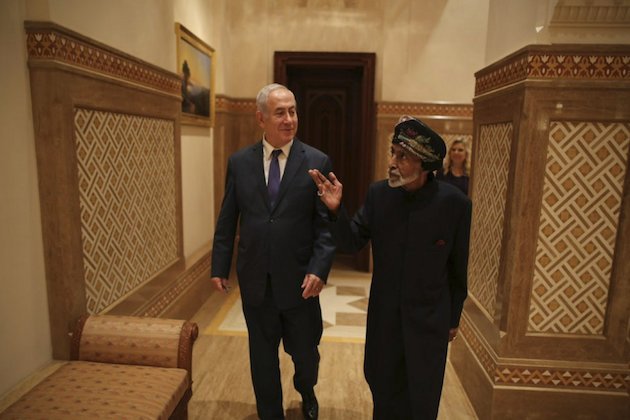2LT International News
Gulf country hosts Israeli prime minister, officials
Oct 27, 2018
MANAMA, Bahrain – The Israeli Prime Minister Benjamin Netanyahu on Friday led a high-level Israeli delegation to an Arab country without any prior announcement from either nation.
The purpose of the visit to Oman has not been disclosed, or who initiated it.
It is unusual in that Israel and Oman do not have diplomatic relations. Arab countries in general, with the exception of Jordan and Egypt, do not recognise Israel.
Accompanying the prime minister and his wife, were the head of Mossad Yossi Cohen, Israel’s national security adviser Meir Ben-Shabbat, the Foreign Ministry director, and other defense officials. They were received at Al Barakah house in Muscat by Sultan Qaboos Bin Said.
Mr Netanyahu in recent years, according to statements by him, has overseen a warming of relations with most Arab countries, particularly Saudi Arabia, the UAE and Bahrain. None of those countries, have acknowledged contacts with Israel, although Bahrain has occasionally hinted at the prospect of a change. On Thursday Mr Netanyahu was again commenting on the growing ties. “You should not underestimate the openness and the thirst in the Arab world today for Israel,” the Israeli prime minister said.
In September, Israel’s Channel 2 reported Energy Minister Yuval Steinitz had just returned from a “secret trip” to Abu Dhabi where he discussed “shared concerns.”
While Mr Netanyahu and his delegation was in Oman on Friday, at the same time Israel’s Culture and Sports Minister Miri Regev was in the UAE for the Abu Dhabi Grand Slam Judo tournament in which Israel’s national team is competing.
The visit by Netanyahu to Oman, the first by an Israeli prime minister in 24 years, followed a visit by Palestinian President Mahmoud Abbas (also known as Abu Mazen) earlier in the week. It is unknown whether Muscat is playing some type of mediation role in talks between the Israelis and Palestinians.
“According to officials, the two leaders discussed ways to take the peace process forward in the Middle East. In addition to that, they also discussed other issues of common interest in order to serve security and stability in the region,” a statement by the Oman News Agency said.
Netanyahu’s office confirmed to AP he had been invited by the sultan after lengthy communications. Oman state TV carried images of the two leaders meeting and Netanyahu shared a video of his visit on his official social media accounts, calling it “a special visit to Oman – making history!”
Oman, a member of the Gulf Cooperation Council does not always operate in line with other GCC states. It did not join the Saudi-UAE-Bahrain blockade of Qatar, nor has it taken part in the Yemen War.
“Netanyahu’s visit is significant,” former CIA director David Petraeus told a security conference in Manama, the Bahrain capital on Saturday. Petraeus was appearing alongside Arab League Secretary-General Ahmed Aboul Gheit at the Manama Dialogue, an annual security conference organized by the International Institute for Strategic Studies.
“The Iranian threat is very real and ‘the enemy of my enemy is my friend’,” Petraeus said.
Other speakers at the conference which began on Friday and was scheduled to continue until Sunday, include Saudi Arabia’s Minister of Foreign Affairs Adel Al-Jubeir, U.S. Defense Secretary James Mattis, Bahraini Foreign Minister Sheikh Khalid bin Ahmed Al-Khalifa, German Defense Minister Ursula von der Leyen, and Japanese Foreign Minister Taro Kono.







